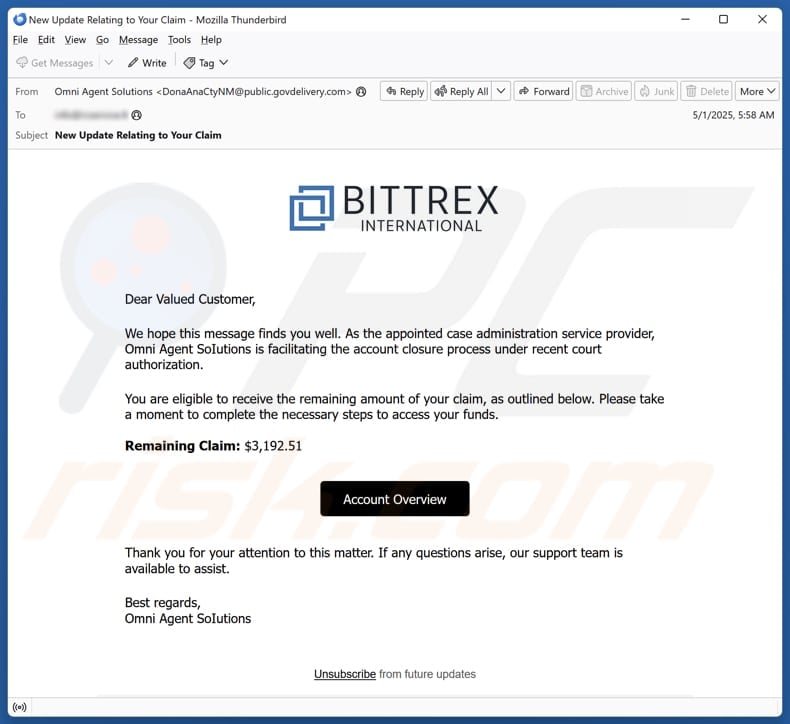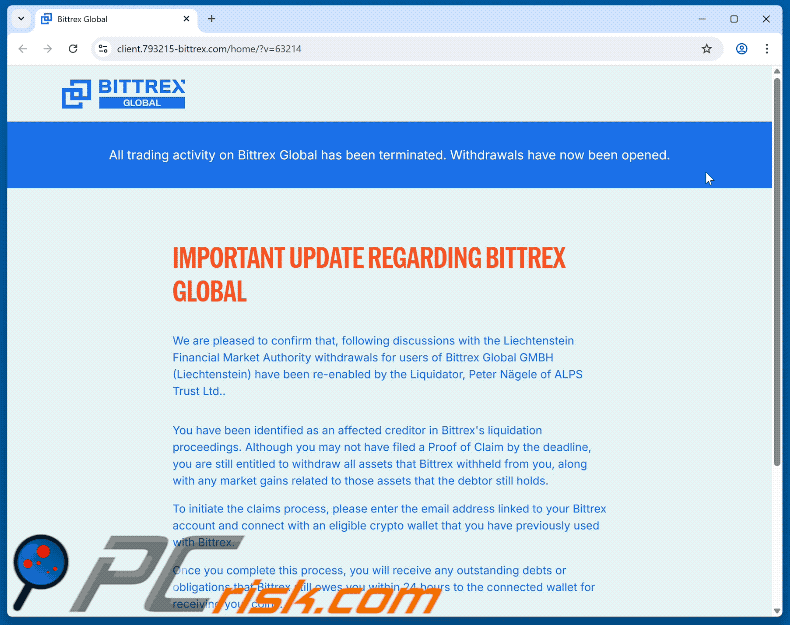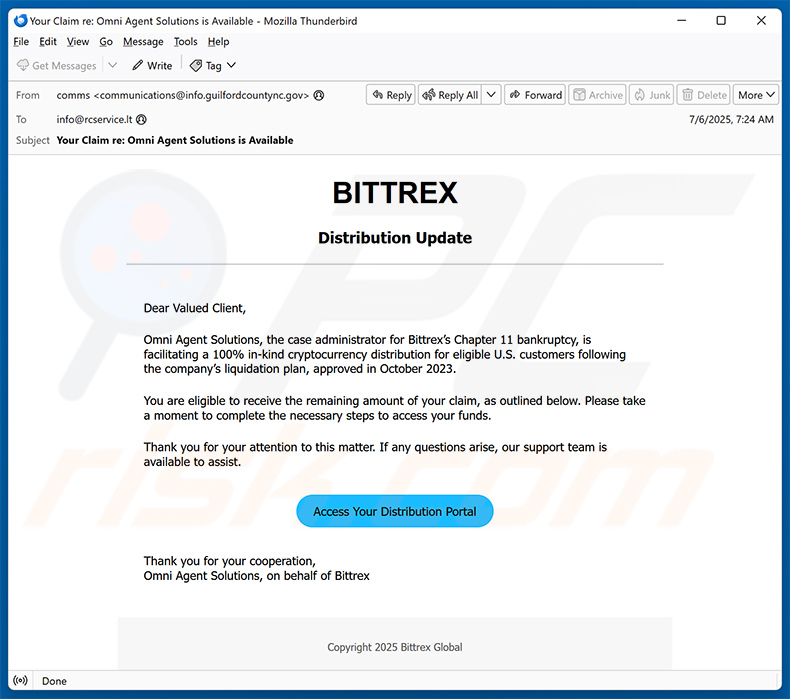How to identify scams like "Bittrex Remaining Claim"
Phishing/ScamAlso Known As: Bittrex Remaining Claim phishing email
Get free scan and check if your device is infected.
Remove it nowTo use full-featured product, you have to purchase a license for Combo Cleaner. Seven days free trial available. Combo Cleaner is owned and operated by RCS LT, the parent company of PCRisk.com.
What kind of scam is "Bittrex Remaining Claim"?
We have inspected the email and discovered that it is a phishing email designed to trick visitors into opening a deceptive website. Once on the site, potential victims are requested to take actions that can lead to cryptocurrency theft. Thus, this and similar emails should be ignored.

More about the "Bittrex Remaining Claim" scam email
This scam email, impersonating a legitimate entity called Omni Agent Solutions, claims the recipient is entitled to receive a remaining claim amount of $3,192.51. It urges the recipient to follow the link (click the "Account Overview" button) to access the funds. The email mimics official communication to appear legitimate.
The provided link leads to a fake Bittrex website containing a fraudulent notice related to Bittrex Global's liquidation. This page claims that users can now withdraw withheld assets and market gains through a process approved by a liquidator. It instructs visitors to enter their email address and connect a crypto wallet previously used with Bittrex.
In reality, this is a phishing scheme designed to trick victims into exposing secret phrases, allowing scammers to steal their cryptocurrency. Therefore, it is important not to provide any information on this page to avoid monetary loss.
| Name | Bittrex Remaining Claim Email Scam |
| Threat Type | Phishing, Scam, Social Engineering, Fraud |
| Fake Claim | The recipient is entitled to receive $3,192.51 |
| Related Domain | client.793215-bittrex[.]com |
| Detection Names (client.793215-bittrex[.]com) | alphaMountain.ai (Malicious), Combo Cleaner (Phishing), G-Data (Phishing), Seclookup (Malicious), Full List Of Detections (VirusTotal) |
| Disguise | Letter from Omni Agent Solutions |
| Symptoms | Unauthorized online purchases, changed online account passwords, identity theft, illegal access of the computer. |
| Distribution methods | Deceptive emails, rogue online pop-up ads, search engine poisoning techniques, misspelled domains. |
| Damage | Loss of sensitive private information, monetary loss, identity theft. |
| Malware Removal (Windows) |
To eliminate possible malware infections, scan your computer with legitimate antivirus software. Our security researchers recommend using Combo Cleaner. Download Combo CleanerTo use full-featured product, you have to purchase a license for Combo Cleaner. 7 days free trial available. Combo Cleaner is owned and operated by RCS LT, the parent company of PCRisk.com. |
Similar scam emails in general
These types of scams impersonate official institutions or events to trick users into providing personal information or accessing their cryptocurrency wallets. They often promise refunds or claim eligibility for unclaimed funds to appear convincing. Users should avoid interacting with suspicious websites and always verify such claims through trusted, official sources.
More examples of phishing emails are "SumUp - Update Your Profile", "MT103 Payment Advice", and "Mailbox Capacity Reduced Email Scam".
How do spam campaigns infect computers?
Email is one of the popular channels cybercriminals use to deliver malware. In such cases, they attach infected/malicious files like executables, ZIP archives, Office documents, PDFs, or scripts. If recipients open these files (or take additional steps), the malware can infiltrate their computers and encrypt files, steal information, or perform other malicious actions.
In other cases, emails can contain misleading links that direct users to compromised websites, where malware may be downloaded automatically, or users are tricked into launching it themselves.
How to avoid installation of malware?
Do not open files or links in irrelevant emails or messages from unknown senders. Regularly run system scans using a trusted security tool. Download software only from reputable sources, such as official websites or trusted app stores. Avoid clicking on pop-ups, ads, or links encountered on questionable websites, and never grant notification permissions to such websites.
Keep your operating system and programs up to date. If you have already opened malicious attachments, we recommend running a scan with Combo Cleaner Antivirus for Windows to automatically eliminate infiltrated malware.
The appearance of the fake Bittrex website, client.793215-bittrex[.]com (GIF):

Text presented in the "Bittrex Remaining Claim" email letter:
Subject: New Update Relating to Your Claim
Dear Valued Customer,
We hope this message finds you well. As the appointed case administration service provider, Omni Agent SoIutions is facilitating the account closure process under recent court authorization.
You are eligible to receive the remaining amount of your claim, as outlined below. Please take a moment to complete the necessary steps to access your funds.
Remaining Claim: $3,192.51
Account OverviewThank you for your attention to this matter. If any questions arise, our support team is available to assist.
Best regards,
Omni Agent SoIutions
Unsubscribe from future updates
Copyright 2025 Omni Agent SoIutions
This email was sent to info@rcservice.lt using govDelivery Communications Cloud on behalf of: Doña Ana County, New Mexico · 845 N Motel Blvd
Another example of an email from "Bittrex Remaining Claim" spam campaign:

Text presented within:
Subject: Your Claim re: Omni Agent Solutions is Available
BITTREX
Distribution Update
Dear Valued Client,
Omni Agent Solutions, the case administrator for Bittrex's Chapter 11 bankruptcy, is facilitating a 100% in-kind cryptocurrency distribution for eligible U.S. customers following the company's liquidation plan, approved in October 2023.
You are eligible to receive the remaining amount of your claim, as outlined below. Please take a moment to complete the necessary steps to access your funds.
Thank you for your attention to this matter. If any questions arise, our support team is available to assist.
Access Your Distribution PortalThank you for your cooperation,
Omni Agent Solutions, on behalf of BittrexCopyright 2025 Bittrex Global
Instant automatic malware removal:
Manual threat removal might be a lengthy and complicated process that requires advanced IT skills. Combo Cleaner is a professional automatic malware removal tool that is recommended to get rid of malware. Download it by clicking the button below:
DOWNLOAD Combo CleanerBy downloading any software listed on this website you agree to our Privacy Policy and Terms of Use. To use full-featured product, you have to purchase a license for Combo Cleaner. 7 days free trial available. Combo Cleaner is owned and operated by RCS LT, the parent company of PCRisk.com.
Quick menu:
- What is Bittrex Remaining Claim phishing email?
- Types of malicious emails.
- How to spot a malicious email?
- What to do if you fell for an email scam?
Types of malicious emails:
![]() Phishing Emails
Phishing Emails
Most commonly, cybercriminals use deceptive emails to trick Internet users into giving away their sensitive private information, for example, login information for various online services, email accounts, or online banking information.
Such attacks are called phishing. In a phishing attack, cybercriminals usually send an email message with some popular service logo (for example, Microsoft, DHL, Amazon, Netflix), create urgency (wrong shipping address, expired password, etc.), and place a link which they hope their potential victims will click on.
After clicking the link presented in such email message, victims are redirected to a fake website that looks identical or extremely similar to the original one. Victims are then asked to enter their password, credit card details, or some other information that gets stolen by cybercriminals.
![]() Emails with Malicious Attachments
Emails with Malicious Attachments
Another popular attack vector is email spam with malicious attachments that infect users' computers with malware. Malicious attachments usually carry trojans that are capable of stealing passwords, banking information, and other sensitive information.
In such attacks, cybercriminals' main goal is to trick their potential victims into opening an infected email attachment. To achieve this goal, email messages usually talk about recently received invoices, faxes, or voice messages.
If a potential victim falls for the lure and opens the attachment, their computers get infected, and cybercriminals can collect a lot of sensitive information.
While it's a more complicated method to steal personal information (spam filters and antivirus programs usually detect such attempts), if successful, cybercriminals can get a much wider array of data and can collect information for a long period of time.
![]() Sextortion Emails
Sextortion Emails
This is a type of phishing. In this case, users receive an email claiming that a cybercriminal could access the webcam of the potential victim and has a video recording of one's masturbation.
To get rid of the video, victims are asked to pay a ransom (usually using Bitcoin or another cryptocurrency). Nevertheless, all of these claims are false - users who receive such emails should ignore and delete them.
How to spot a malicious email?
While cyber criminals try to make their lure emails look trustworthy, here are some things that you should look for when trying to spot a phishing email:
- Check the sender's ("from") email address: Hover your mouse over the "from" address and check if it's legitimate. For example, if you received an email from Microsoft, be sure to check if the email address is @microsoft.com and not something suspicious like @m1crosoft.com, @microsfot.com, @account-security-noreply.com, etc.
- Check for generic greetings: If the greeting in the email is "Dear user", "Dear @youremail.com", "Dear valued customer", this should raise suspiciousness. Most commonly, companies call you by your name. Lack of this information could signal a phishing attempt.
- Check the links in the email: Hover your mouse over the link presented in the email, if the link that appears seems suspicious, don't click it. For example, if you received an email from Microsoft and the link in the email shows that it will go to firebasestorage.googleapis.com/v0... you shouldn't trust it. It's best not to click any links in the emails but to visit the company website that sent you the email in the first place.
- Don't blindly trust email attachments: Most commonly, legitimate companies will ask you to log in to their website and to view any documents there; if you received an email with an attachment, it's a good idea to scan it with an antivirus application. Infected email attachments are a common attack vector used by cybercriminals.
To minimise the risk of opening phishing and malicious emails we recommend using Combo Cleaner Antivirus for Windows.
Example of a spam email:

What to do if you fell for an email scam?
- If you clicked on a link in a phishing email and entered your password - be sure to change your password as soon as possible. Usually, cybercriminals collect stolen credentials and then sell them to other groups that use them for malicious purposes. If you change your password in a timely manner, there's a chance that criminals won't have enough time to do any damage.
- If you entered your credit card information - contact your bank as soon as possible and explain the situation. There's a good chance that you will need to cancel your compromised credit card and get a new one.
- If you see any signs of identity theft - you should immediately contact the Federal Trade Commission. This institution will collect information about your situation and create a personal recovery plan.
- If you opened a malicious attachment - your computer is probably infected, you should scan it with a reputable antivirus application. For this purpose, we recommend using Combo Cleaner Antivirus for Windows.
- Help other Internet users - report phishing emails to Anti-Phishing Working Group, FBI’s Internet Crime Complaint Center, National Fraud Information Center and U.S. Department of Justice.
Frequently Asked Questions (FAQ)
Why did I receive this email?
Scammers probably got your email address from a data breach, a fake website, or a similar source. They typically send the same scam message to a large group of people, which means the emails are often generic (not personal).
I have provided my personal information when tricked by this email, what should I do?
If you have entered your secret phrase on a deceptive page, change it as soon as possible. If your wallet cannot be accessed anymore, contact the service provider to report the incident and see what they can do.
I have downloaded and opened a malicious file attached to an email, is my computer infected?
Malicious attachments can initiate an infection when opened or further interacted with. The likelihood of infection varies depending on the type of file that was opened.
I have read the email but did not open the attachment, is my computer infected?
Opening or reading an email by itself is generally harmless. Malware usually only affects a system when the recipient engages with harmful links or opens attachments that are infected.
Will Combo Cleaner remove malware infections that were present in email attachment?
Combo Cleaner can detect and remove most known malware infections. However, advanced threats tend to hide deep within the system, making them more difficult to detect. To effectively identify and eliminate such threats, it is essential to perform a full system scan.
Share:

Tomas Meskauskas
Expert security researcher, professional malware analyst
I am passionate about computer security and technology. I have an experience of over 10 years working in various companies related to computer technical issue solving and Internet security. I have been working as an author and editor for pcrisk.com since 2010. Follow me on Twitter and LinkedIn to stay informed about the latest online security threats.
PCrisk security portal is brought by a company RCS LT.
Joined forces of security researchers help educate computer users about the latest online security threats. More information about the company RCS LT.
Our malware removal guides are free. However, if you want to support us you can send us a donation.
DonatePCrisk security portal is brought by a company RCS LT.
Joined forces of security researchers help educate computer users about the latest online security threats. More information about the company RCS LT.
Our malware removal guides are free. However, if you want to support us you can send us a donation.
Donate
▼ Show Discussion